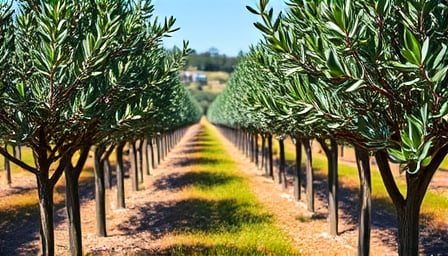Cobram Estate Olives Limited, a prominent player in the Consumer Staples sector, has recently come under scrutiny due to its financial performance and market positioning. As a company specializing in the production of extra virgin olive oil, Cobram Estate Olives has carved out a niche within the Australian market, operating exclusively within the country. However, the company’s financial metrics and market behavior raise several critical questions about its sustainability and strategic direction.
As of September 4, 2025, Cobram Estate Olives’ stock closed at AUD 3.23, a figure that, while seemingly stable, belies the volatility experienced over the past year. The stock’s 52-week high reached AUD 3.35, yet it plummeted to a low of AUD 1.565 on September 8, 2024. This significant fluctuation underscores the inherent risks and uncertainties facing the company, reflecting broader market dynamics and perhaps internal challenges.
The company’s market capitalization stands at AUD 1.34 billion, a testament to its substantial presence in the industry. However, this valuation is juxtaposed against a Price Earnings (P/E) ratio of 80.337, a figure that is alarmingly high. Such a ratio suggests that investors are pricing in substantial future growth, yet it also raises concerns about the company’s current profitability and the realistic prospects of achieving such growth. The high P/E ratio could be indicative of overvaluation, leaving the company vulnerable to market corrections.
Cobram Estate Olives’ operations are based in DOCKLANDS, Australia, where it focuses on producing high-quality olive oil products. Despite its specialization, the company’s exclusive focus on the Australian market may limit its growth potential. In an era where global expansion is often a key driver of success for consumer staples companies, Cobram Estate Olives’ domestic-only strategy could be seen as a strategic misstep. The company’s reluctance or inability to diversify its market presence may hinder its ability to capitalize on international demand for premium olive oil products.
Moreover, the company’s financial health and operational efficiency are critical areas of concern. The significant stock price volatility and the high P/E ratio suggest that Cobram Estate Olives may be facing underlying challenges that could impact its long-term viability. Investors and stakeholders must critically assess whether the company’s current strategies are sufficient to navigate the competitive landscape and achieve sustainable growth.
In conclusion, while Cobram Estate Olives Limited has established itself as a key player in the Australian olive oil market, its financial metrics and strategic choices warrant a closer examination. The company’s high P/E ratio, stock price volatility, and domestic-only market focus raise important questions about its future prospects. As the company continues to operate within the ASX All Markets, it must address these challenges to ensure its long-term success and stability in an increasingly competitive industry.
